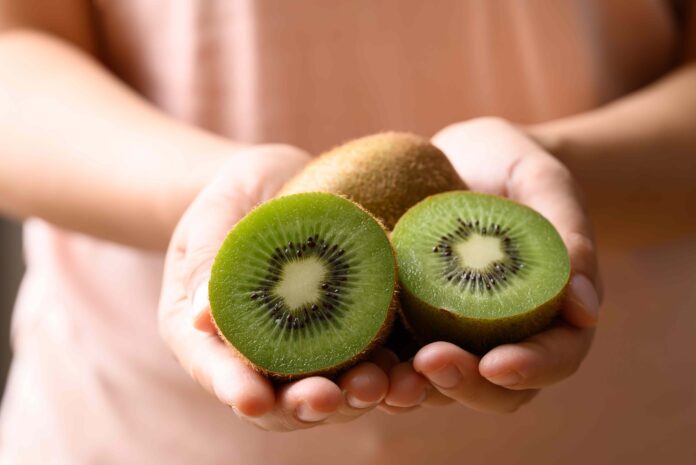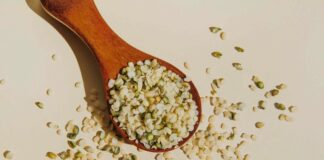Kiwis are known for their vibrant green flesh and tangy sweetness – a nutritional punch packed into every bite. But while many people toss aside those fuzzy brown skins, they hold a secret weapon: even greater health benefits. Adding kiwi skin to your diet could be a simple way to boost your well-being.
Here’s why you should reconsider ditching that tough exterior:
A Concentrated Dose of Immune Support
Kiwis are already celebrated for their antioxidant powerhouses like vitamin C and vitamin E, which combat cell damage and strengthen the immune system. Surprisingly, these nutrients are even more concentrated in the skin. Eating your kiwi with its natural armor means a bigger dose of these protective compounds.
Iron Absorption Gets a Boost
Iron is essential for carrying oxygen throughout your body, but many people struggle to absorb enough from plant-based sources. Vitamin C plays a crucial role in aiding this absorption, particularly for non-heme iron found in foods like vegetables and beans. By leaving the kiwi skin on, you combine its vitamin C with iron-rich meals, potentially making it easier for your body to utilize that vital mineral.
A study published in the Journal of Agricultural and Food Chemistry showed just how impactful this can be: participants who ate two kiwis daily alongside an iron-fortified breakfast cereal for 16 weeks saw significant improvements in their iron levels.
Keeping Blood Pressure in Check
Kiwi’s heart health benefits extend beyond antioxidants. Both the fruit and its skin are packed with potassium, a mineral that counteracts the negative effects of excess sodium on blood pressure. Magnesium, also found in kiwi skin, helps relax blood vessels, further promoting healthy circulation.
Digestive Harmony: The Fiber Advantage
Adding kiwi skin to your diet could be especially beneficial for your digestive system. Research suggests that the extra fiber present in the skin can increase your intake by a whopping 50% — and that’s good news for gut health! Fiber promotes regular bowel movements and, when it reaches the colon, serves as food for beneficial bacteria. This leads to the production of short-chain fatty acids (SCFAs) which are linked to improved digestion, reduced risk of colorectal cancer, and overall gut health.
Beyond Cholesterol: A Holistic Approach
Kiwi itself is naturally cholesterol-free, but its soluble fiber content takes things a step further. This type of fiber slows down digestion, aiding in regulating both cholesterol and blood sugar levels. Additionally, a thriving gut supported by soluble fiber can indirectly strengthen the immune system and potentially speed up recovery from illness.
A Word on Taste and Texture: What to Expect
While the kiwi flesh boasts a bright, tangy flavor, its skin tends toward a more earthy or bitter note. The fuzziness and texture of standard green kiwis might feel off-putting for some. Luckily, gold kiwis and hardy kiwis offer smoother, fuzz-free skins that are generally considered more palatable.
Considerations Before Eating the Skin: Know Your Triggers
While incorporating kiwi skin into your diet is generally safe, certain individuals might want to approach it with caution:
- Sensitive Mouths or Acid Reflux: Kiwis are acidic, which can cause tingling sensations or burning for those with sensitive mouths, dry mouth, or conditions like GERD or LPR.
- Oral Allergy Syndrome: Kiwi contains proteins similar to pollen allergens. People with OAS may experience itching or swelling in their mouth and throat after eating raw kiwi, especially the skin.
- Kidney Stones: Kiwi skins contain calcium oxalate crystals that can irritate tissues and might contribute to kidney stone formation in susceptible individuals.
- Latex Allergies: Kiwi shares proteins similar to those found in latex, potentially triggering reactions ranging from sneezing to difficulty breathing.
- Actinidin Sensitivity: This protein found in kiwi can cause a mild burning or tingling sensation on the tongue for some people who aren’t allergic.
Tips for Enjoying Kiwi Skin: Make it Work for You
While kiwi skin may not be for everyone, there are ways to make its consumption more enjoyable and safe:
- Ripening: Wrap your kiwis in a paper bag at room temperature for 2-3 days, away from direct sunlight. Refrigerate ripe kiwis to extend their freshness.
-
Storage: Avoid storing kiwis near ethylene-producing fruits like bananas or apples as they can cause overripening.
-
Cleaning: Rinse kiwis thoroughly with cool water and a produce brush. Pat dry. If fuzz bothers you, gently rub it off with a towel or blend the fruit into smoothies.
In conclusion, kiwi skin is more than just an inedible husk—it’s a powerhouse of nutrients that can amplify the health benefits of this already delicious fruit. While some may find the taste and texture less appealing, exploring different kiwi varieties and incorporating them strategically into your diet can be a flavorful way to boost your overall well-being.























